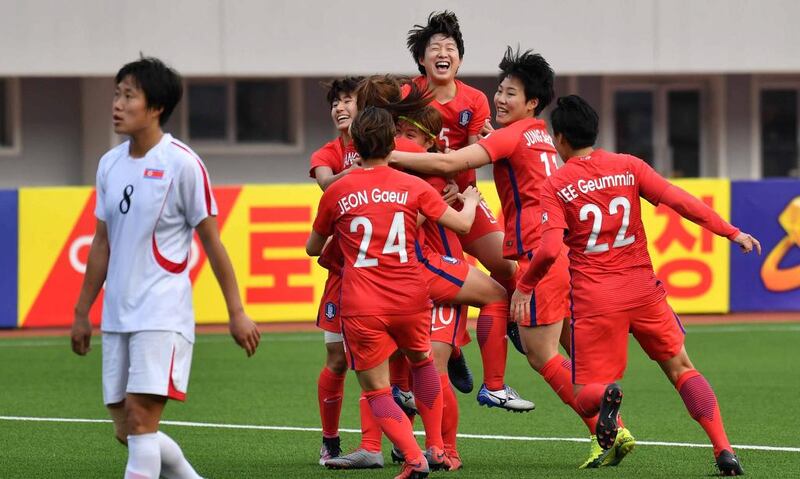PYONGYANG // So you believe sport is a path to peace? If so, Pyongyang was the wrong place to be on Friday, as the two Koreas — technically at war for nearly 70 years — faced off in a rare football match.
On the field, Korean women fought to a 1-1 draw. But in the stands, more than 40,000 fans made clear the game did not reflect a thaw in deeply troubled Korean relations.
There was the sound of tens of thousands of voices singing in praise of the North Korean fatherland. There were Pyongyang university students shouting slogans in near-perfect unison. There was a low rumble of discontent any time a South Korean player touched the ball.
And from the South Korean fans? Well, if there were any in Kim Il Sung stadium they were keeping very quiet.
Amid global nervousness that North Korea may be about to test its sixth nuclear device, and as more than 200,000 South Korean and American soldiers held their annual joint military exercises, a football match in Pyongyang — along with an inter-Korean ice hockey game held the same day in South Korea — was not bringing brotherhood any time soon to the Korean Peninsula.
In Pyongyang, the underdog South Korean players jumped with joy and hugged when the match ended, thrilled not to lose. The North Korean players lined up on the field to half-heartedly shake hands with their opponents, while tens of thousands of disappointed fans quietly filed out.
“Our players showed their strength, and their ability to attack the South Koreans,” university student Pak Yong Jin said as he left the stadium, carrying his briefcase in one hand and a cardboard bullhorn he had used to shout encouragement in the other. Asked if he thought a tie may have been the best result, given so many decades of enmity, he politely made clear he thought the question was foolish.
“I have no feelings about the South Korean players,” he said. “I only wish our players had scored more goals.”
The game, the first-ever official football face off in Pyongyang between the two Koreas, was one in a series of women’s Asian Football Confederation qualifying matches being held here in April.
In better days, there was fairly regular contact between the two Koreas — sporting events, academic discussions, talks about business and investment. But Seoul has suspended almost all civilian exchanges since a nuclear test by Pyongyang in January 2016, and amid a flurry of missile tests.
Neither the football nor the hockey match received much attention in South Korea, with news reports mostly limited to short dry stories.
Yang Moo-jin, a professor at Seoul’s University of North Korean Studies, said the South’s indifference was a wasted opportunity to use sports as a diplomatic tool, even just to resume basic communications.
*Associated Press





